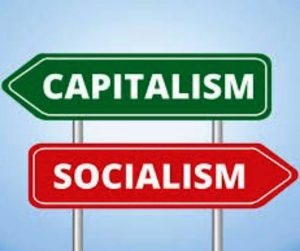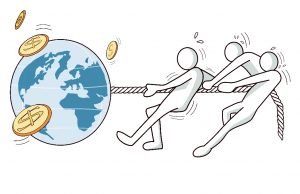Differences between capitalism and socialism: Capitalism is a political and economic theory positing that the means of production be controlled by private individuals. It is centered on private individuals owning and controlling the production and distribution of goods and services. Untamed capitalism is extreme capitalism, where private individuals are unrestrained and can choose what to sell, how to sell, who to sell to, and the price to sell it. This is called a laissez-faire market, which operates without government or regulatory agency interference. The focal aim of capitalism is to make profit. It has no regard for equality as inequality foster competition and need for innovation.
According to Karl Marx, capitalism is a system that alienates the masses because of the obvious distinction between the rich (bourgeoisie) and the poor (proletariat). The bourgeoisie owns the means of production and gets all the profits made while the proletariat, who make up the majority of the masses are the workers/ laborers who get the work of production done. They have no claim to the profit except for the paltry sum they are paid by their employers, the bourgeoisie. Today, this is no longer applicable, because governments in the world now regulate some of the actions of private businesspeople.

Socialism is a political and socio-economic theory that advocates for social ownership of the means of production. It is based on public ownership of machinery, tools, and factories use to produce goods to satisfy human needs. In its purest form, socialism entails that the government is in control of all activity relating to production and distribution. Socialism aims to ensure equal distribution of goods and services among the citizens and create an equitable society where there is no distinction between the rich and the poor.

A modern form of socialism has evolved in the 21st century, it is called democratic socialism. Socialism is subject to the endeavors of every individual from the community, who have to pool together to control factors of production and share the returns equally.
Recommended: Advantages and Disadvantages of a Capitalist System
Top 5 Major Differences between Capitalism and Socialism
1. Taxation: The socialist economy is run on taxpayers’ money because the essential services are accessible and affordable for all. An example of social services is healthcare which is provided free to everyone and this cannot be run without money, hence the heavy taxes on the citizens.

Taxation in a capitalist state is based on individual income. A person pays as much tax as he earns and if he/she does not earn at all, they don’t pay tax. This is disadvantageous to anyone who cannot pay for essential services like healthcare because the government does not make adequate provisions for free or affordable health care to all.
2. Ownership of means of production: Means of production here means to refer to land, labor, and capital needed to produce goods and services. In capitalism, the means of production are owned by private individuals, based on the belief that individuals should have the right to manage their affairs. This also breeds corruption as wealthy people lobby the government to make and enforce laws that would suit them (monopoly), thereby increasing the gap between the bourgeoisie and proletariat.

Socialists on the other hand believe means of production should belong to everyone and not just a selected few. The government control of the means of production brings about a balance between the rich and the poor because essential needs like education and healthcare would be available for all. In socialist states, there are universal basic income, universal healthcare, and tax-sponsored education which helps indigent citizens.
Also see: Advantages and Disadvantages of a mixed economy
3. Income distribution: As highlighted above, socialist states have programs like the universal basic income, which allows all workers to be paid the same wage. Income distribution here is equally distributed according to the dictates of the government or the needs of the citizens. Income equality in a socialist state makes the poor able to access essentials like education and healthcare, usually at the expense of the heavy taxes imposed on the rich.

For capitalists, income distribution is determined by market forces. This is founded on the belief that allowing market forces to control the distribution of income would ensure efficient management of resources than in the control of the government.
Also see: Countries with the highest standards of living in the world
4. Economic growth/innovation: The availability of choice to the consumers in capitalist states equals more businesses, bringing about competition in the market. With competition, comes innovation which creates newer job opportunities, and ultimately boosts economic growth. The profit made from the sale of goods and services is rechanneled into these innovations. Some of these innovations might end up failing and crushing the business.
The Socialist system does not compensate for innovation, probably because there is no competition. The workers and businesses are usually not motivated to improve on the goods and services. On the positive side, it prevents business failures for risky investments or monopolies.
5. Choice: In a capitalist economy, which is usually a competitive market, there is an array of choices available to the consumers. The average citizen makes decisions for them and bears the consequences. There is usually more than one person selling a particular product or offering a service, consumers can choose which they prefer. It gives the best product for the best prices. Freedoms of choice influence demand which is a key driver in a capitalist economy. The exchange of goods and services is voluntary.
In a socialist state, the government caters to all the basic needs of the citizens hence is no choice to be made as there are no options. The government controls the goods’ quality and prices. The exchange of goods, labor, or services is somewhat forced.
Socialism is most frequently criticised for its arrangement of social services programs demanding heavy taxes on the citizens which might decelerate economic growth. Capitalism on the other hand is often condemned for its propensity to permit pay imbalance and classification of people based on financial capacities. It was in the effect of alienating the workers who actually produce from the owners who merely owned the means of production that Karl Marx based his criticism of capitalism.
Recommended: Reasons why africa is undeveloped explained
Few countries in the world practice pure forms of capitalism or socialism. Norway, Sweden, and Denmark lean towards socialism because healthcare, education, and pension are government-owned, but there is still a gap between the rich and the poor as statistics have shown that about 65% of the country’s wealth is owned by 10% of the population. China, Russia, and Cuba seem to be the few socialist states in the world. The major difference between capitalism and socialism is the ownership of means of production. A mixed economy is the most popular because it strikes a balance between the merits of capitalism and socialism.

Edeh Samuel Chukwuemeka, ACMC, is a lawyer and a certified mediator/conciliator in Nigeria. He is also a developer with knowledge in various programming languages. Samuel is determined to leverage his skills in technology, SEO, and legal practice to revolutionize the legal profession worldwide by creating web and mobile applications that simplify legal research. Sam is also passionate about educating and providing valuable information to people.